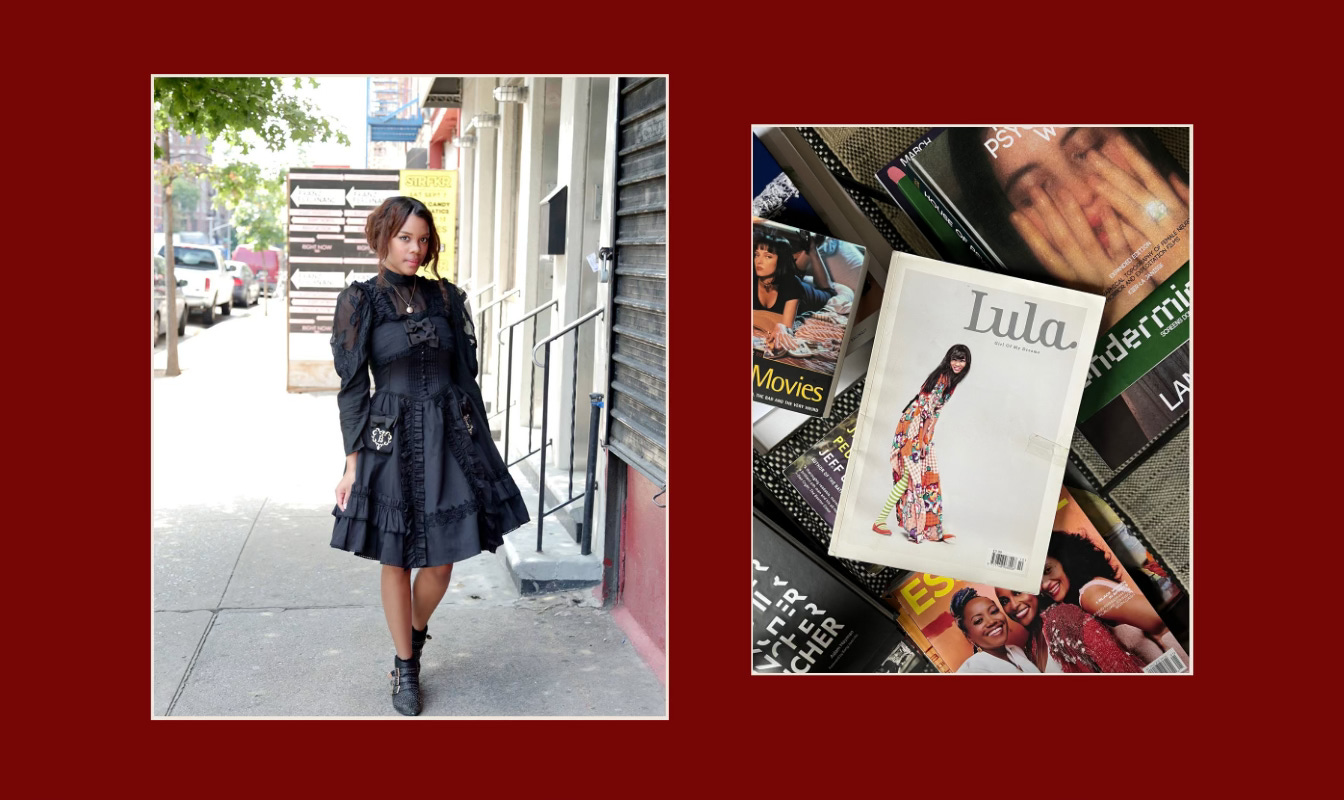The RLT Interview explores all the things, people, and places that have informed a person's taste and, more importantly, sense of self.
This week, I chat with screenwriter Nialla LeBouef, who most recently wrote for the television show Evil, for which she received a Writer’s Guild Award nomination.
Get to know LeBouef as she muses about horror movies, Fruits Magazine, and goth culture.
On Taste
In many ways, my taste was preordained. My dad was an actor when I was younger and before that, a DJ in the early '70s and '80s in DC, so I literally grew up surrounded by vinyl, and a lot of my taste comes from him. He and my mother's commitment to art is a huge part of life. We, my sister and I, grew up watching a lot of movies. Our movie nights would consist of people that my dad considered masters of their craft; he was like a teacher first and father second. His idea of raising children was to give us as much culture as he possibly could. A lot of my early memories are directly tied to film because cinema became a way of viewing the world—it dipped into almost being a religion. There was a book that my dad had that I would flip through when I was a kid; It was called Making Light of It. It’s like this manifesto of cinema where the director is God, the theater is your church, and you're watching this shared dream in a dark room with a bunch of people. I started viewing this as art and entertainment, but there was also a deeply spiritual aspect to that. I didn't really have a religious upbringing. My God was movies and music and whoever else might've heard me.
My taste started veering left of my parents. For instance, I grew up listening to a lot of jazz just by default. Then I started to almost rebel by listening to the complete opposite of that. A friend of mine introduced me to System of a Down and From First to Last, and I started listening to emo and screamo. When I came back to my house and I would turn the music up, my parents were like, “Wait, what the fuck is this?” One big album that I think about a lot is Collision Course, the Jay-Z and Linkin Park collaboration, which was huge. The moment I played it in the car, my mom was like, “No.” I wanted to go see Mastodon; they were playing at the 9:30 Club, and my mom literally saw them and said, “These white men look angry.” And I was like, “You don't understand. These white men are screaming for me.” That's what I thought about when I was listening to their music, these genres where the entire thing is, “I'm marginalized.” Bands would sing about isolation, depression, being on the fringe of society, not being accepted—who better than a young Black girl from DC to understand that? So, they were yelling for me.
There was a Tower Records up the street from my high school, and if my mom was picking me up, I would sit there and wait. I found Fruits Magazine, and it changed my entire life. It was all Japanese street style, and it didn't occur to me that people could dress this way, go outside, and exist in the world. I didn't own the magazines, but I would just sit on the floor and look at them. It felt like everybody was an individual within the collective. Then I found Lolita fashion, and within that, gothic Lolita. It was such a joy to view clothing and dressing as an art with many steps. And I hate to admit it, but I like rules. I like a bit of structure. So, I liked having a silhouette that you had to have in order to fit the subculture. You would have your petticoat, your bloomers, socks, and lace. I found a community through that, but I would also dress up in this way and go out alone. That gets you looked at; it gets you talked to, and I consider myself to be a bit of an introvert, but it was really fun to have both community and also these clothes feel like such a fiber of my being.
My personal philosophy is, if this is not fun, I need to pivot. I remember the exact moment it happened. I was doing up a bunch of buttons on a blouse, and I tied the bows, and I looked at my outfit and I was like, “Yeah, I'm done.” It's still a fashion that I adore to this day, and I still have all the dresses, so who knows? I pivoted into vintage. I started watching a lot of old movies, and I started really idolizing femme fatales, seeing Dorothy Dandridge and Lauren Bacall. I have a little collection of 1940s dresses. There was a vintage store up the street from my house, so after school or on weekends, I would walk to that store and just browse. I started viewing fashion and taste almost like a treasure hunt. It's something that’s not going to jump out at you immediately—you have to dig for it.
On Discovery
I was a huge reader of Lula; it felt like a magazine that got mysterious girlhood. They had so many amazing articles, and they would interview everybody from filmmakers to fashion designers to musicians. It was a way to see how people were putting their outfits together but also to pick and pull what I liked. Movies, of course, were another influence—seeing how people would put their outfits together but then understanding that it is a costume with a story. I would take those principles and infuse them into my daily life.
I keep thinking about how I wasn't able to just go out and buy everything that I wanted. I remember showing my mom, “Oh, I'm really into this fashion,” and she was like, “Oh, that's really beautiful. You can get a job. You can save up for it,” because it was expensive. I think it’s important to be able to think about who you are when you don’t have instant gratification. What are you interested in when you can't just pick it up immediately? Are you still even interested in the aesthetic and subculture if you can't have it right away? I wasn't able to have it right away, but it was so revered.
In gothic Lolita, for example, I didn't have the brand names immediately, and I could only maybe buy a pair of shoes or a pair of socks or a bow. So, you have to build an outfit, but in doing so, you discover, “Okay, what do you like within this?” I try to take that as I go. And that's not to say that I've never followed trends. One thing I'm realizing is that I have followed trends my entire life. So, I don't think that there's anything inherently wrong with following a trend, but it has to be something that resonates with me and that I can see myself wearing long-term—until I look at myself in the mirror and go, “This isn't fun anymore.”
On Desire
Keep reading with a 7-day free trial
Subscribe to Ridiculous Little Things to keep reading this post and get 7 days of free access to the full post archives.








